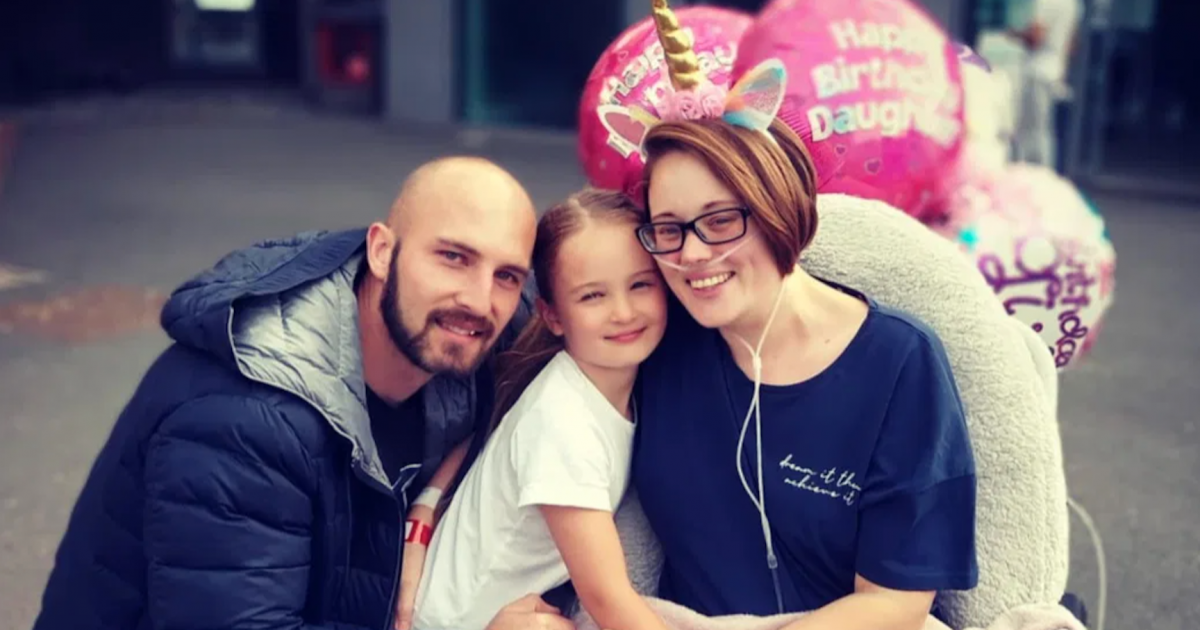A Secondary Cancer
- Intensive care nurse Brogan Williams, 33, who was in remission for breast cancer, felt some back pain along with shortness of breath in October 2020. Initially misdiagnosed with COVID, it wound up being secondary cancer in her lungs.
- The wife and mother is now fighting for her life with advanced stage cancer, writing letters to her daughter for important milestones.
- It is crucial to not skip screenings and follow-ups during the pandemic, and a leading expert urges patients to be your own advocate.
She had a scan of her spine, then was misdiagnosed with COVID (despite showing a negative test), with doctors unfortunately missing the mark that her cancer had spread to her lungs. After a delay in getting in to see a doctor face to face, she finally was diagnosed last month, and was told she would need palliative care.
Read MoreWilliams’ oncologist found a lump in her neck in June and sent her for an immediate scan and biopsy. The wife and mother says her cancer is now very advanced. “It's in my neck and I have two spots on my liver which they can't rule out as cancer too.”
She feels she wasn’t taken seriously. “There's a whole persona in the medical community that you're too young to have secondary cancer,” she said.
Now, she has been coming to terms with her tragic prognosis. “I'm a ticking time-bomb. They've filled the outside of my lungs with talcum powder to try and stop them from filling up,” she said. “The cancer will keep pushing the fluid out and stopping me from breathing until it will eventually completely stop my lungs.”
Williams is waiting to see if there is a treatment that can help her. “Without treatment, it literally will just kill me.”
Mom Lorraine, 56, is taking care of her daughter full time while Williams’ husband Gareth works. Williams is sleeping in her parents’ bedroom for comfort.
Williams has started writing letters to her 5-year-old daughter Freya to read throughout her life. "I'm writing letters for her which people may see as a sign of giving up but it's me taking control,” she said. “I always want her to know exactly what I'd say to her in certain situations like her first period or the first time she meets a boy and gets those butterflies.”
Williams admits that the letters make things seem more final. “It sends your head a bit mental though because you start to accept it.”
Brogan’s Initial Breast Cancer Diagnosis
Brogan’s family set up a GoFundMe when she was diagnosed in January 2019 with “stage 3 grade 3 Her2 positive invasive breast cancer with confirmed lymph nodes spread.”
Her husband noticed her nipple was inverted as they were trying for a baby. She thought it was a sign of pregnancy, but unfortunately received the ultimate blow when she went to get checked out, that she had cancer.
Related: An Introduction to Breast Cancer Symptoms & Diagnosis
Williams had six rounds of aggressive chemotherapy, and suffered from an anaphylactic reaction to her last treatment, which is when your immune system overreacts to a certain trigger and you may have a hard time breathing. This type of extreme allergic reaction can be life-threatening.
Then she underwent a single mastectomy and lymph node clearance with temporary reconstruction, which also left Williams with complications.
Related: For Breast Reconstruction After Mastectomy, Women May Choose 'Now,' 'Later,' or 'Never'
Nicknamed “Complication Queen,” her body also had a hard time getting through 15 rounds of radiation. During chemo, she was also told her heart was failing so she had to stop to “strengthen her left ventricle.”
In March, she had another mastectomy on the right breast with more complications, but luckily her heart was stable.
Bottom line, in order to avoid a late-stage diagnosis, it is imperative to get checked regularly. The problem is, Williams was only 30 years old when she was diagnosed with breast cancer, and most doctors don’t recommend to get mammograms until 40 or even 45. Now, some experts say 35, but what about all the younger people getting diagnosed with breast cancer? It is unclear whether Williams has a family history of breast cancer, but that is another important way to stay ahead of a late-stage diagnosis.
It is also crucial to be your own advocate and push to get in to see a doctor despite the limited appointments during the pandemic.
Advocating for your Health
When it comes to your health, be a little pushy. You know your body better than anyone else. When you see a doctor for a problem, don't hesitate to make sure that your question is fully answered and that you are comfortable with the plan moving forward. From a doctor's perspective, every problem should have a diagnosis, a treatment, a plan for follow-up, and a plan for what happens next if the treatment doesn't work.
As a patient, if you don't feel like each of these four things has been accomplished, just ask! Even if it requires multiple visits or seeing additional providers for a second opinion, always be your own advocate.
Dr. Zuri Murrell from Cedars Sinai Medical Center in Los Angeles urges patients to push back when they feel that something is off.
“The truth is you have to be in tune with your body, and you realize that you are not the statistic,” Dr. Murrell told SurvivorNet. “That’s why it’s important for you to actually educate yourself and be your own health care advocate.”
Be Pushy, Be Your Own Advocate
It's Important To Continue Cancer Screenings Through COVID-19
Learn more about SurvivorNet's rigorous medical review process.


